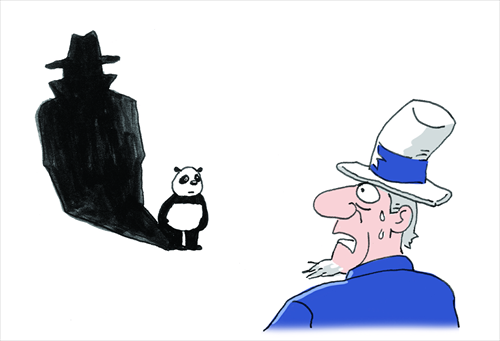HOME >> OP-ED
Espionage charges risk hurting science
By Charles Gray Source:Global Times Published: 2015-6-2 20:23:01

Illustration: Liu Rui/GT
The recent arrest of Professor Zhang Hao from Tianjin University and the indictment of five other Chinese nationals on charges of violating the Economic Espionage Act (EEA) raises difficult questions when it comes to the relationship between the US and China.
Scientific cooperation between the two nations is at a higher level than ever before, with hundreds of thousands of Chinese students and professionals working in the US. But there is nothing more likely to hamper this mutually beneficial relationship than a perception that the US government is going out of its way to target these individuals for prosecution.
The EEA occupies a gray area when it comes to protecting trade secrets. It does not refer to military espionage, or the transmission of classified information, nor does it refer to the theft of trade secrets for private gain. The EEA is intended to combat the theft of trade secrets for the benefit of another nation. However, the prosecution must be able to prove that the theft was both intended for and benefited the foreign government in question.
American prosecutors currently argue that because Tianjin University is a State-run institution, the alleged espionage falls under the ambit of this law, even though the company these individuals formed, ROFS Microsystem, was the primary beneficiary of this alleged theft.
However, proving such a link will be very challenging for US prosecutors. Attempting to extend this law to cover cases where an alleged theft may benefit a government or where there is an incidental relationship between the suspect and his or her nation could see virtually every alleged theft of trade secrets coming under its ambit.
Furthermore, without direct evidence such as stolen blueprints, the question must be raised whether the information was actually stolen as opposed to the accused individuals making use of the knowledge gained during their employment.
While this might be seen as a violation of non-disclosure or non-competition agreements made by the individual, it would not be actionable under the EEA. This is especially true given that none of the current indictments allege the use of hacking or other illegal techniques to obtain the information in question.
Another issue with the EEA is the fact that it currently has no explicit exception for the process of reverse engineering another business' product. However, the reverse engineering of an existing product or technology is generally considered a legitimate tactic, so long as the company engages in the process of developing its own version of the product or technique in question.
Past prosecutions have had a mixed record, such as that of Sherry Chen in 2014. That case was especially notable due to the fact that Chen is a naturalized US citizen. This case, initially proclaimed as an example of espionage directed at the US by China, eventually collapsed and ended with the dismissal of all the charges facing Chen as well as the reinstatement of her benefits and salary.
Perhaps the most dangerous issue regarding these prosecutions is the widely held perception that there is a racial bias at play.
There is wide concern that Chen's national origins may have played a role in her prosecution, especially given US society's history of anti-Chinese sentiment. When combined with the potential overreach found within the EEA, further prosecutions could lead to the perception that it is dangerous to be a Chinese national or Chinese American working in any field that is seen as economically important to the US.
Ultimately, such a perception could damage or destroy what has been an extremely profitable economic and scientific relationship for both nations.
There will always be economic tension between the US and China. However, the economies of both nations are dependent upon maintaining friendly and mutually beneficial trade relations.
While the protection of a nation's intellectual property is always an important issue, moves to expand the use of the EEA against Chinese businesspersons and scientists may very well do more harm than good. As Chen's experience shows, the improper use of espionage laws can result in an embarrassing failure for prosecutors and a personally trying experience for the accused.
The author is a freelance writer based in Corona, California. charlesgray109@gmail.com
Posted in: Viewpoint